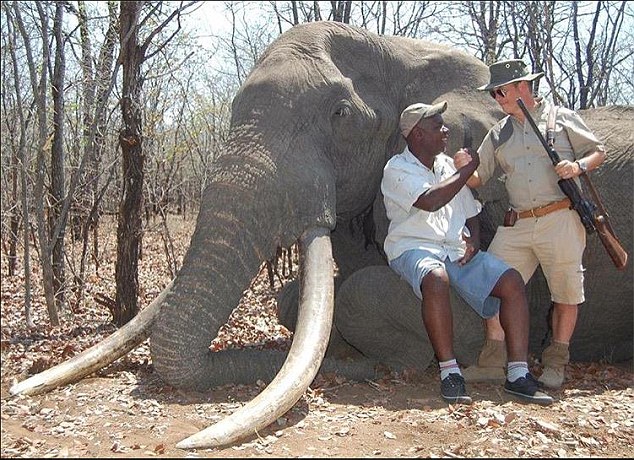
In a rather macabre turn of events, one of Africa’s largest elephants has been shot dead by a German hunter, less than three months after the killing of Cecil the Lion caused international outrage amongst animal lovers.
The killing is believed to have occurred on October 8 on a private hunting estate bordering Gonarezhou National Park in south-east Zimbabwe. Despite the gargantuan size of the bull elephant, believed to be between 40 and 60-years-old, its exact identity and origins are unknown.
Facebook images posted by Anthony Kaschula, who operates a photo safari firm in Gonarezhou, suggested that the elephants tusks added up to an astounding combined weight of 120lb (54kg). Indeed, they were so heavy that they couldn’t be carried, but reportedly had to be dragged along the ground instead.
Writing alongside the images, the tour operator summed up what will likely be many readers’ sentiments worldwide: ‘[We] should acknowledge that animals such as this one are of far more value alive (to both hunters and non-hunters) than dead.. and should be off limits to hunting.’
The hunt’s organisers have refused to reveal the identity of the German National who shot the elephant. But it is known that he’d travelled to Zimbabwe to conduct a 21-day game hunt of the ‘Big Five’: elephants, leopards, lions, buffalo and rhinoceros.
The man—seen in the photographs fist-clasping the experienced hunter who acted as his guide, rifle casually slung over his shoulder— allegedly paid £39,000 ($60,000) for a permit to slay a large bull elephant. There is no indication that the hunt was in any way illegal.
According to The Telegraph, which first broke the story, the man who helped arrange the shoot defended his client further: ‘We hunters have thick skins and we know what the greenies will say. This elephant was probably 60 years old and had spread its seed many many times over.’
The issue of big game hunting in Africa has come to the fore recently after Cecil the Lion—a major attraction at Zimbabwe’s Hwange National Park—was killed by US dentist Walter Palmer with a high-powered crossbow in July, as apart of an organised hunt.
The killing sparked furious worldwide condemnation from protestors and animal rights charities, with many international airlines pledging to no longer carry big-game trophies aboard flights in the wake of the incident.
However, advocates of hunting point out that trophy shooting takes place in 23 sub-Saharan African nations, generating over £128 million worth of revenue each year—often in areas not supported by traditional tourist economies—and acts as a powerful anti-poaching and conservation tool.
With regards to this incident, the hunt organiser said his organisation paid as much as 70 per cent of its hunting fees back to the local community and observed quotas for animals.
‘This is good for Zimbabwe and good for local people. It’s not uncommon for hunters to spend $100,000 (£64,551) each trip.’



